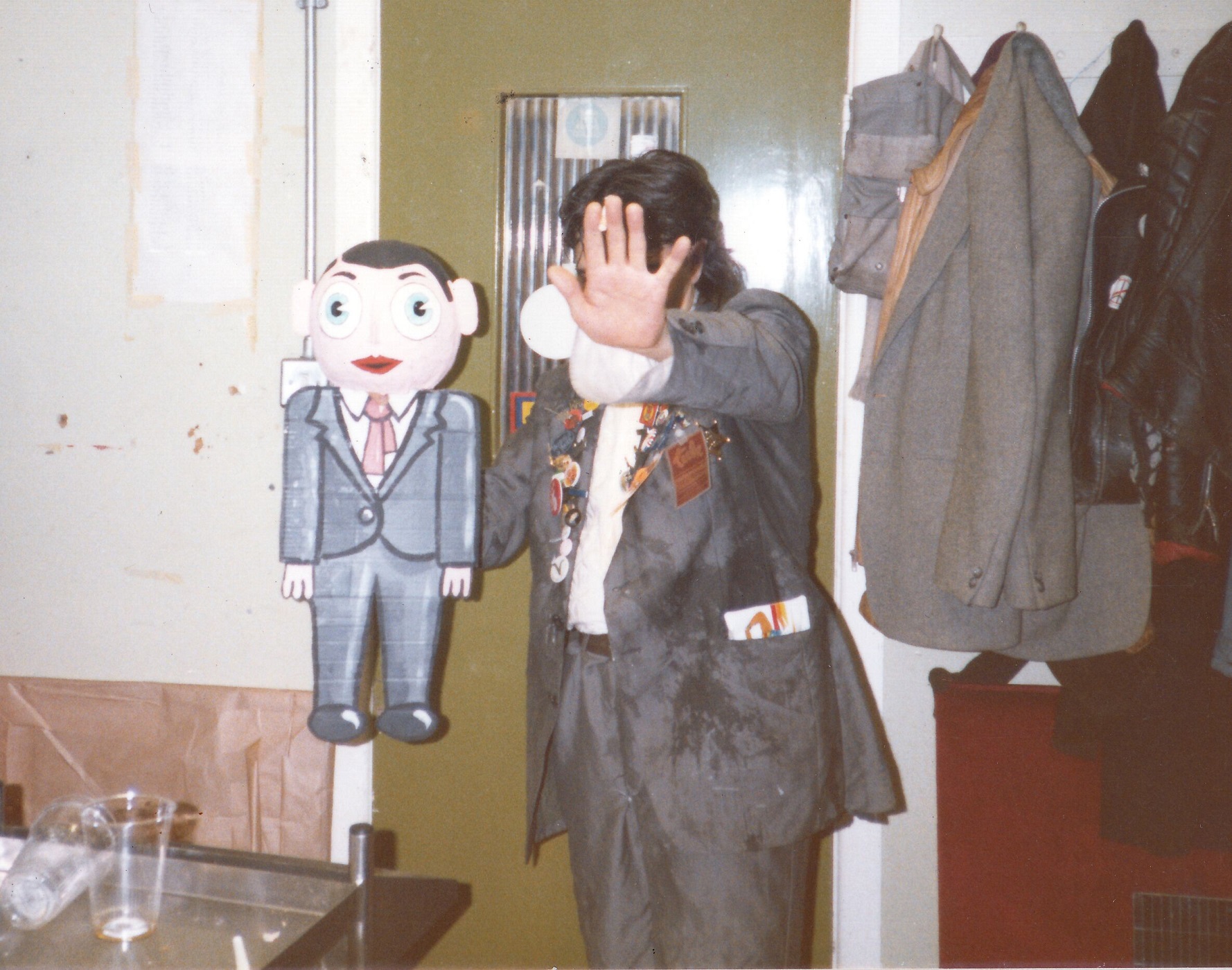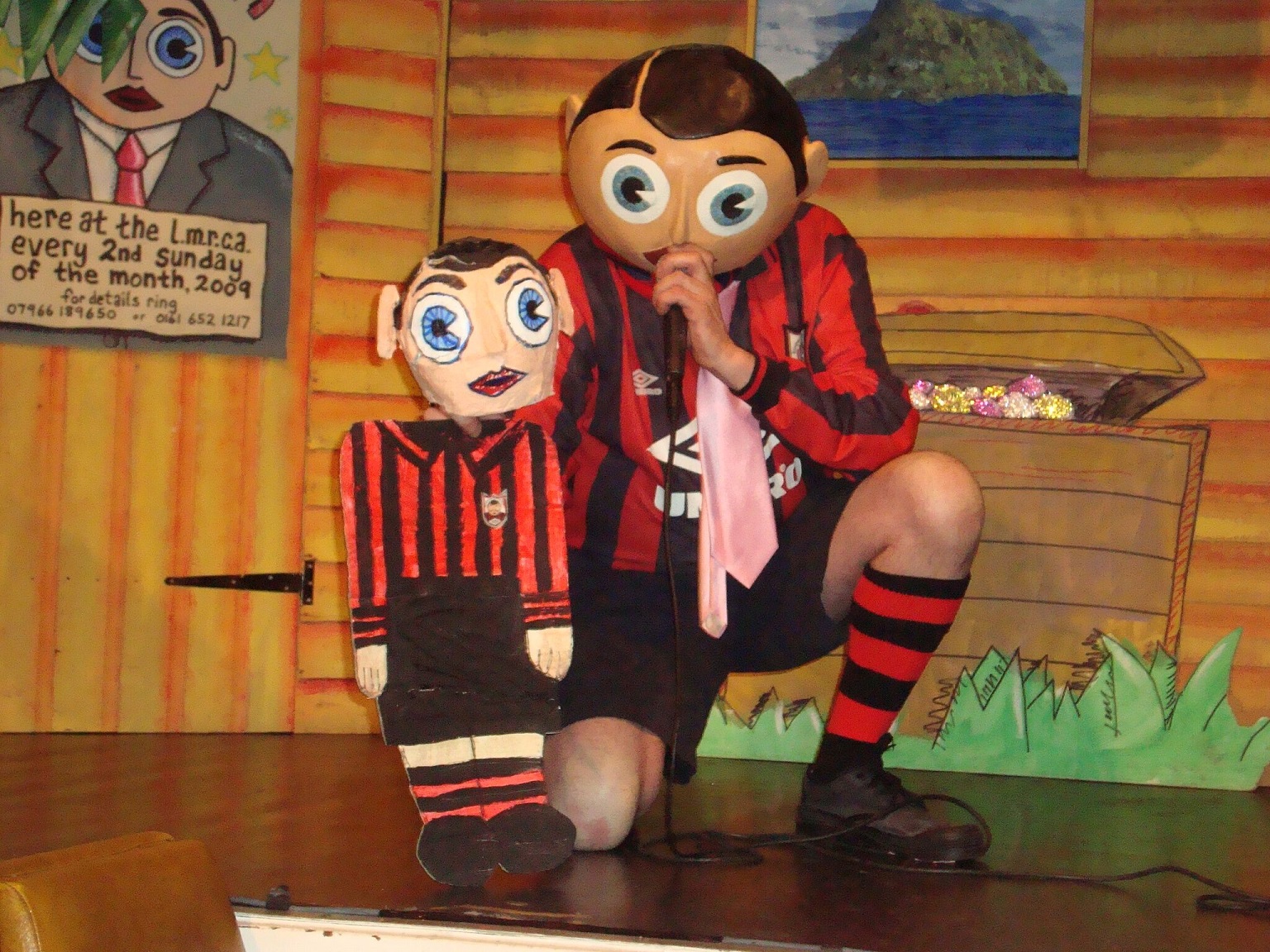Being Frank: The Chris Sievey Story review - inside Sidebottom's head | reviews, news & interviews
Being Frank: The Chris Sievey Story review - inside Sidebottom's head
Being Frank: The Chris Sievey Story review - inside Sidebottom's head
The inspiring saga of an artist hidden behind a mask

Frank Sidebottom was a petulant, man-child showbiz trouper with a papier-mâché head. He was more spontaneously subversive than memories of his heyday rampaging round Nineties kids TV may suggest. As to the rigorously hidden man behind the mask, he was more peculiarly brilliant than that.
Steve Sullivan’s revelatory documentary finally unveils Chris Sievey, who only averted a pauper’s funeral in 2010 thanks to an outpouring of public support, but left 100 boxes of art in a damp cellar which are in their way priceless. Sullivan’s obsessive sifting of this obsessive creative life reveals the difference between making it in the X–Factor sense, and Sievey’s making of minutely crafted VHS tapes, letters, football programmes, records and even a gorgeous Sidebottom animated show, rarely bothering about sleep, or whether anyone saw the result.
 Sievey was self-made, too. The example of his beloved Beatles and acid’s altering of his perceptions convinced a man with no social advantages to “make a living doing what I like”. Whether this involved learning to computer-program in order to scratch a stylus-activated one onto a 1982 B-side, or playing pool on a moving tour van, realism rarely detained him. He was pushing, John Cooper Clarke notes, “some mystery envelope”. Somewhere between Barnes Wallis and Syd Barrett, or perhaps Bob Mortimer and Prince, he was a Northwest legend as Sidebottom, but even there barely known as himself. Sullivan pieces together an unworldly, self-destructive but beloved man.
Sievey was self-made, too. The example of his beloved Beatles and acid’s altering of his perceptions convinced a man with no social advantages to “make a living doing what I like”. Whether this involved learning to computer-program in order to scratch a stylus-activated one onto a 1982 B-side, or playing pool on a moving tour van, realism rarely detained him. He was pushing, John Cooper Clarke notes, “some mystery envelope”. Somewhere between Barnes Wallis and Syd Barrett, or perhaps Bob Mortimer and Prince, he was a Northwest legend as Sidebottom, but even there barely known as himself. Sullivan pieces together an unworldly, self-destructive but beloved man.
Sievey’s early life included a 1971 trip from Cheshire to London, where he insisted on auditioning for Apple Records. His subsequent emulation of his heroes led to 27 consecutive flop singles, often with his band The Freshies. Highly melodic, morphing from New Wave to synthpop and sung in a Lennonesque, echo-drenched voice, this was his intended path to success. He was waylaid, bandmate and DJ Mark Radcliffe recalls, by “an endless supply of stupid but quite clever ideas”.
 The “compulsive nature” unsurprisingly identified by his ex-wife Paula inevitably led to decline. Money, a barely understood concept anyway, went on drink, women and cocaine when Sidebottom hit the relative big time. There are unprepossessing images of that head among and sometimes on half-naked women in absurd Bacchanals, and a bleary, bloated Sievey. His alcoholism badly affected his family. But their memories are more rueful than bitter.
The “compulsive nature” unsurprisingly identified by his ex-wife Paula inevitably led to decline. Money, a barely understood concept anyway, went on drink, women and cocaine when Sidebottom hit the relative big time. There are unprepossessing images of that head among and sometimes on half-naked women in absurd Bacchanals, and a bleary, bloated Sievey. His alcoholism badly affected his family. But their memories are more rueful than bitter.
Sullivan avoids the cliché of dwelling on a comic’s “dark side” (as if it was surprising that people can be funny and complex). Sievey’s period away from Frank crafting beautiful models for Bob the Builder and his final return to his creation both show his art was undimmed. Exhibit one: Mike Joyce settling, bored, into Smiths yarns on a Sidebottom TV show only seen in Manchester. “Right,” says Frank, more bored. “I’m having a shower.” So he does.
A Sidebottom statue now stands in his Timperley hometown. Sullivan adds this memorial to Sievey’s secret, stubborn life of art.
rating
Explore topics
Share this article
The future of Arts Journalism
You can stop theartsdesk.com closing!
We urgently need financing to survive. Our fundraising drive has thus far raised £49,000 but we need to reach £100,000 or we will be forced to close. Please contribute here: https://gofund.me/c3f6033d
And if you can forward this information to anyone who might assist, we’d be grateful.

Subscribe to theartsdesk.com
Thank you for continuing to read our work on theartsdesk.com. For unlimited access to every article in its entirety, including our archive of more than 15,000 pieces, we're asking for £5 per month or £40 per year. We feel it's a very good deal, and hope you do too.
To take a subscription now simply click here.
And if you're looking for that extra gift for a friend or family member, why not treat them to a theartsdesk.com gift subscription?
more Film
 Beating Hearts review - kiss kiss, slam slam
Romance and clobberings in a so-so French melodrama
Beating Hearts review - kiss kiss, slam slam
Romance and clobberings in a so-so French melodrama
 Materialists review - a misfiring romcom or an undercooked satire?
Writer-director Celine Song's latest can't decide what kind of film it is
Materialists review - a misfiring romcom or an undercooked satire?
Writer-director Celine Song's latest can't decide what kind of film it is
 theartsdesk Q&A: actor Leonie Benesch on playing an overburdened nurse in the Swiss drama 'Late Shift'
The Guildhall-trained German star talks about the enormous pressures placed on nurses and her admiration for British films and TV
theartsdesk Q&A: actor Leonie Benesch on playing an overburdened nurse in the Swiss drama 'Late Shift'
The Guildhall-trained German star talks about the enormous pressures placed on nurses and her admiration for British films and TV
 Freakier Friday review - body-swapping gone ballistic
Lindsay Lohan and Jamie Lee Curtis's comedy sequel jumbles up more than their daughter-mother duo
Freakier Friday review - body-swapping gone ballistic
Lindsay Lohan and Jamie Lee Curtis's comedy sequel jumbles up more than their daughter-mother duo
 Eight Postcards from Utopia review - ads from the era when 1990s Romania embraced capitalism
Radu Jude's documentary is a mad montage of cheesy TV commercials
Eight Postcards from Utopia review - ads from the era when 1990s Romania embraced capitalism
Radu Jude's documentary is a mad montage of cheesy TV commercials
 The Kingdom review - coming of age as the body count rises
A teen belatedly bonds with her mysterious dad in an unflinching Corsican mob drama
The Kingdom review - coming of age as the body count rises
A teen belatedly bonds with her mysterious dad in an unflinching Corsican mob drama
 Weapons review - suffer the children
'Barbarian' follow-up hiply riffs on ancient fears
Weapons review - suffer the children
'Barbarian' follow-up hiply riffs on ancient fears
 theartsdesk Q&A: filmmaker Dag Johan Haugerud on sex, love, and confusion in the modern world
The writer-director discusses first-love agony and ecstasy in 'Dreams', the opening UK installment of his 'Oslo Stories' trilogy
theartsdesk Q&A: filmmaker Dag Johan Haugerud on sex, love, and confusion in the modern world
The writer-director discusses first-love agony and ecstasy in 'Dreams', the opening UK installment of his 'Oslo Stories' trilogy
 Oslo Stories Trilogy: Dreams review - love lessons
First love's bliss begins a utopian city symphony
Oslo Stories Trilogy: Dreams review - love lessons
First love's bliss begins a utopian city symphony
 Blu-ray: Two Way Stretch / Heavens Above!
'Peak Sellers': two gems from a great comic actor in his prime
Blu-ray: Two Way Stretch / Heavens Above!
'Peak Sellers': two gems from a great comic actor in his prime
 Late Shift review - life and death in an understaffed Swiss hospital
Petra Volpe directs Leonie Benesch in a compelling medical drama
Late Shift review - life and death in an understaffed Swiss hospital
Petra Volpe directs Leonie Benesch in a compelling medical drama

Add comment